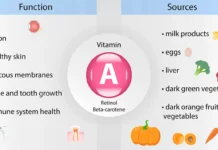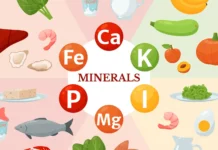In this article – Healthy Eating, basic rules and nutrients. While some extreme diets are based on completely different advice, you must remember that the human body needs protein, carbohydrate, fiber, vitamins and minerals to be healthy. It is absurd to eliminate entire food groups, you can simply replace them with healthier options.
What Is Healthy Eating
Healthy eating involves making choices that promote overall well-being and provide essential nutrients to support optimal physical and mental health. Here are some key principles of healthy eating:
- Balanced Diet: Consume different foods from a large variety, including, vegetables, fresh fruits, lean proteins, whole grains and fats. This ensures that you get a broad spectrum of nutrients.
- Portion Control: You need to be careful about portion serving to avoid accident overeating. Moderate eating helps maintain a normal weight and prevents excessive calorie intake.
- Nutrient-Dense Foods: Choose foods that are rich in nutrients but relatively low in calories. Nutrient-dense options include fruits, vegetables, lean proteins, whole grains, and low-fat dairy.
- Limit Processed Foods: Minimize the intake of processed and packaged foods, as they often contain high levels of salt, sugar, and unhealthy fats.
- Hydration: Drink an water in adequate portions every day. Water is essential for many body functions like nutrient absorption, regulation of body temperature and others.
- Moderation in Sugar and Salt: Limit the consumption of added sugars and salt. Too much sugar can contribute to weight gain and various health issues, while excess salt intake may lead to high blood pressure and other cardiovascular problems.
- Healthy Fats: Include sources of healthy fats in your diet, such as avocados, nuts, seeds, and olive oil. These fats are important for brain health, hormone production, and overall cellular function.
- Regular Meals: Aim for regular, balanced meals to maintain stable energy levels throughout the day. Skipping meals can lead to overeating later on and may negatively impact metabolism.
- Mindful Eating: Eat slowly and savor your food, which can help prevent overeating and promote better digestion.
- Personalized Approach: Everyone is different, and individual dietary needs vary. Consider factors such as age, gender, activity level, and any specific health conditions when determining your nutritional requirements.
It’s important to note that healthy eating is not about strict diets or deprivation but rather adopting a sustainable and enjoyable lifestyle that supports your overall health and well-being. Consulting with a healthcare professional or a registered dietitian can provide personalized advice based on your specific needs and goals.
Basic Rules Of Healthy Eating
The basic rules of healthy eating can be summarized in several main types of macronutrients in which can be found in the food. While individual dietary needs may vary, these general macronutrients needs to controlled.
Protein
Protein gives you the power to move and keep going while keeping your mood and energy up. Eating too much protein can be harmful for people with kidney disease, but the latest research suggests that many of us need more high-quality protein, especially as we age. This doesn’t mean you have to eat more animal products – different plant sources of protein each day can ensure your body gets all the essential nutrients it needs.
Carbohydrates
Carbohydrates are one of the main sources of energy in your body. But you should try to get this energy from complex, unrefined carbohydrates (vegetables, whole grains, fruits), not from sugars and refined ones. Cutting out white bread, sweets, starches and sugar can prevent rapid spikes in blood sugar, mood swings and energy, and the accumulation of fat, especially around your waistline.
Fats
Not all fats are the same. While “bad” fats can ruin your diet and lead to disease risks, “good” fats protect your brain and heart. In fact, healthy/good fats – like omega-3s – are vital to your physical and emotional health. Including more healthy fats in your diet can help improve your mood, your health, and even maintain a slim waistline.
Fibers
Eating foods high in dietary fiber (grains, fruits, vegetables, nuts, and beans) can speed up your metabolism and help reduce your risk of heart disease, stroke, and diabetes. They can also improve your skin and help you lose weight.
Calcium
In addition to leading to osteoporosis, lack of calcium in your diet can also contribute to anxiety, depression, and difficulty sleeping. Regardless of your age or gender, it’s vital to eat calcium-rich foods, limit those that deplete calcium, and get enough magnesium and vitamins D and K to help calcium do its job for you.
Be Patient, Transition To Healthy Eating Takes Time
Making the switch to healthy eating doesn’t have to be a matter of life and death. You don’t have to be perfect, you don’t have to completely cut out the foods you like, and you don’t have to change everything all at once—that usually just leads to frustration or giving up on your new eating plan.
A better move would be if you make small changes, gradually. Keeping your goals a little more modest can help you achieve more in the long run without feeling deprived or overwhelmed.
Consider planning a healthy menu in a series of small, manageable steps – adding a salad once a day. Once your small changes become a habit, you can continue to add even healthier foods.
To set yourself up for success, try to make things easy. Eating a healthier diet doesn’t have to seem complicated. Instead of getting too caught up in counting calories, for example, think about your diet in terms of color, variety and freshness. Focus on avoiding packaged and processed foods and choose fresher ingredients whenever possible.
Read the labels. It’s important to know what’s in your food, as manufacturers often hide large amounts of sugar or unhealthy fats in packaged food, even food that claims to be healthier.
Focus on how you feel after eating. This will help encourage new healthy habits. The healthier the food you eat, the better you will feel after eating. The more food you take in, the more likely you are to feel uncomfortable, nauseous, or exhausted.
Drink lots of water. Water helps flush our digestive system of waste products and toxins, yet many of us live quite dehydrated – causing fatigue, low energy and headaches. I assume you know that water fills you up, so staying well hydrated will help you make healthier choices for your next meal.
Important:
Don’t skip breakfast and eat small amounts throughout the day. A healthy breakfast can rev up your metabolism, and eating small, healthy meals will keep you energized throughout the day.
Avoid eating late at night. Try to eat dinner earlier so that you have 14-16 hours until breakfast the next morning. Eating only when you are most active and giving your digestive system a break each day helps with weight management.














